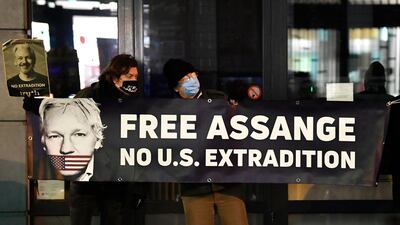The US has appealed a British judge's ruling that blocked the extradition of WikiLeaks founder Julian Assange, a Justice Department official said Friday.
A brief filed late Thursday declared Washington's desire to have Mr Assange stand trial on espionage and hacking-related charges over WikiLeaks' publication of hundreds of thousands of US military and diplomatic documents beginning in 2009.
The Justice Department had until Friday to register its stance on Judge Vanessa Baraitser's January 4 ruling that Mr Assange suffered mental health problems that would raise the risk of suicide if he were sent to the US for trial.
"Yes, we filed an appeal and we are continuing to pursue extradition," Justice Department spokesman Marc Raimondi said.
After Judge Baraitser's decision, which did not question the legal grounds for the US extradition request, the outgoing Trump administration moved to appeal.
But it was not known until Friday what the incoming Joe Biden administration would do.
After WikiLeaks began publishing US secrets in 2009, then-president Barack Obama, under whom Mr Biden served as vice president, declined to pursue the case.
Mr Assange said WikiLeaks was no different than other media constitutionally protected to publish such materials.
Prosecuting him could lead to cases against other US news organisations for publishing similar material – legal fights the government would likely lose.
But under former president Donald Trump, whose 2016 election campaign received a boost after WikiLeaks published materials that damaged his rival Hillary Clinton, the Justice Department built a national security case against Mr Assange.
In 2019, he was charged under the US Espionage Act and computer crimes laws, with multiple counts of conspiring with and directing others to illegally obtain and release US secrets from 2009 to 2019.
In doing so, he aided and abetted hacking, illegally exposed confidential US sources to danger and used the information to damage the country, according to the charges.
If convicted on all counts, Assange, 49, could face a prison sentence of 175 years.
"Julian Assange is no journalist," said Assistant Attorney General John Demers at the time.
Mr Assange has been detained by British authorities pending the appeal.
Earlier this week, 24 organisations, including Human Rights Watch, Amnesty International USA and Reporters Without Borders, urged Mr Biden to drop the case.
"Journalists at major news publications regularly speak with sources, ask for clarification or more documentation, and receive and publish documents the government considers secret," they said in an open letter.
"In our view, such a precedent in this case could effectively criminalise these common journalistic practices."
Mr Assange's fiancée Stella Moris said in a statement that Judge Baraitser's decision stating that Mr Assange was at high risk for suicide and that US prison facilities were not safe remained a strong reason to deny extradition.
Judge Baraitser "was given clear advice by medical experts that ordering him to stand trial in the US would put his life at risk," she said.
"Any assurances given by the Department of Justice about trial procedures or the prison regime that Julian might face in the US are not only irrelevant but meaningless because the US has a long history of breaking commitments to extraditing countries," she said.

